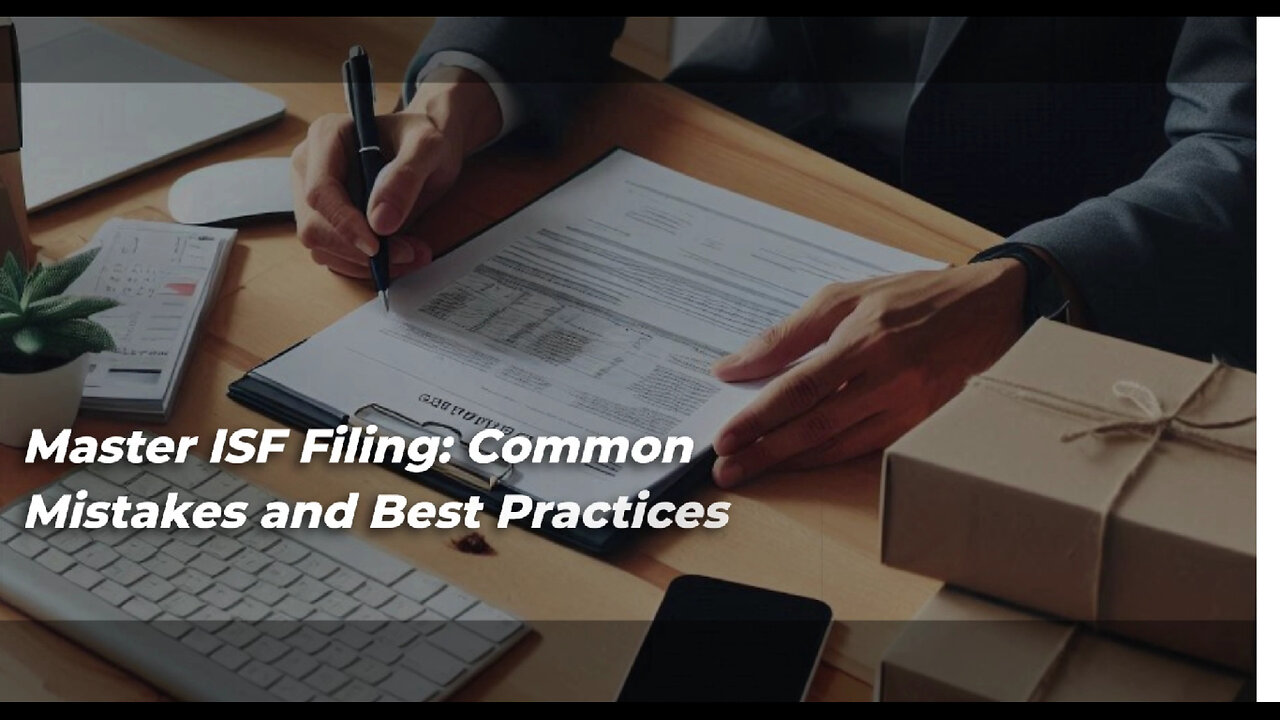Premium Only Content

Mastering ISF Filing: Common Mistakes and Best Practices for Success
ISF Checklist || 805-970-7918 || contact@isfchecklist.com || www.isfchecklist.com
In today's video, we discussed the topic of Importer Security Filing (ISF) and highlighted common mistakes and best practices for successful filing. Failing to file the ISF on time and providing inaccurate or incomplete information are two prevalent mistakes that can lead to penalties and delays. To overcome these errors, it is crucial to be proactive, ensure timely filing, and double-check all information before submission. Additionally, having a solid understanding of ISF requirements and engaging the services of a customs broker are effective best practices. Collaborating with overseas suppliers and maintaining proper record-keeping practices are also essential for successful ISF filing.
Proper compliance with ISF regulations is essential for a smooth import process, as it allows customs authorities to assess and manage risks effectively. Failing to file the ISF on time can result in delays or even the denial of entry to goods. Therefore, it is crucial to familiarize yourself with the specific deadline for filing the ISF, which is at least 24 hours before the goods are loaded onto a vessel destined for the United States.
Accurate and complete information on the ISF is vital, as customs authorities rely on this information for risk assessment purposes. Common errors include inaccurately documenting buyer and seller information, HTS codes, and country of origin. Double-checking all information before submission can help avoid penalties and delays.
To ensure successful ISF filing, it is essential to have a thorough understanding of the ISF requirements. This includes familiarizing yourself with the ISF form and its various fields. Staying informed about any changes or updates to the ISF requirements is also crucial to ensure compliance. This can be accomplished through regularly checking for updates from customs authorities or working with a trusted customs broker who can provide guidance.
Engaging the services of a customs broker can be highly beneficial when it comes to ISF filing. Customs brokers are professionals who specialize in customs regulations and can assist with accurate completion of the ISF form, provide guidance on compliance, and help resolve any issues that may arise during the filing process. They have comprehensive knowledge of the customs rules, regulations, and requirements, and can navigate the complexities of the customs processes with ease.
Collaboration with overseas suppliers or shippers is also crucial for successful ISF filing. Developing strong relationships with them ensures smooth communication and the timely provision of accurate data. This collaboration is especially important when it comes to obtaining the necessary information for the ISF, such as the seller's and buyer's information, which may be located outside the United States.
Furthermore, proper record-keeping practices are essential for monitoring compliance and serving as evidence in case of disputes or audits. Retaining copies of the filed ISF, transaction receipts, and other relevant documents will help you stay organized and provide documentation when needed.
In conclusion, successful ISF filing requires submitting the ISF on time, providing accurate and complete information, understanding the ISF requirements, considering the services of a customs broker, fostering collaborative relationships with overseas suppliers, and maintaining proper record-keeping practices. By following these best practices, importers can minimize the risk of penalties, delays, and non-compliance, ensuring a smooth and efficient customs clearance process.
#usimportbond #isfcustomsbroker #uscustomsclearing #isfentry
Video Disclaimer Here: This video is purely educational and has no ties with the US government.
0:13 - ISF filing is crucial for successful customs brokerage and international trade
0:26 - Common mistakes include late filing, inaccurate information, and lack of understanding of ISF requirements
1:32 - Best practices include filing on time, providing accurate information, understanding ISF form, using a customs broker, collaborating with overseas suppliers, and maintaining proper record-keeping
-
 38:41
38:41
Sarah Westall
7 hours agoHealth Freedom Under Attack, Dr Robert Young Found Guilty on Suspicious Victimless Crime, Matt Hazen
43.4K4 -
 LIVE
LIVE
Vigilant News Network
6 hours agoDataRepublican Exposes the Shadow Government’s Darkest Secrets - Exclusive Interview | Media Blackout
1,684 watching -
 31:39
31:39
Peter Santenello
1 year agoStories From Vegas' Golden Era 🇺🇸
41.9K24 -
 LIVE
LIVE
The Why Files
9 hours agoLIVE: The Why Files 24/7 Stream n' Chat
1,340 watching -
 55:15
55:15
Russell Brand
1 day agoThe Truth About Big Pharma & COVID with Dr. Aseem Malhotra
161K7 -
 1:19:48
1:19:48
The Rubin Report
10 hours agoWhat the Trump Administration Must Do Instead of Revenge | Peter Thiel
120K163 -
 1:59:00
1:59:00
Steve-O's Wild Ride! Podcast
3 days ago $36.02 earnedPatrick Bet-David DESTROYS Steve-O's Dad - Wild Ride #252
143K49 -
![[XboxONE] GRINDING 1000g FC24](https://1a-1791.com/video/fwe1/01/s8/1/y/k/I/o/ykIoy.0kob-small-XboxONE-GRINDING-1000g-FC24.jpg) 3:29:15
3:29:15
deathbee
13 hours ago[XboxONE] GRINDING 1000g FC24
96.7K10 -
 1:08:32
1:08:32
Winston Marshall
1 day agoThe HIDDEN Agenda: Congresswoman Hageman UNCOVERS USAID Fraud, Censorship and Human Trafficking
123K139 -
 8:16
8:16
CarlCrusher
1 day agoThe True Story of Stranger Things and the Montauk Project Origins
75K26